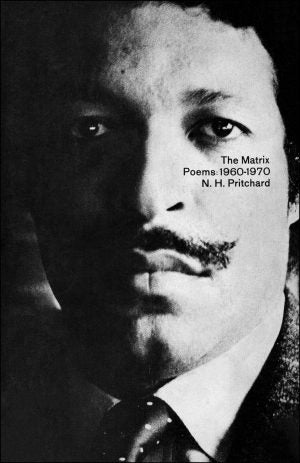The Matrix Poems: 1960-1970 by Norman H. Pritchard
Sorry, this title is currently out of stock. If you would like a copy please contact mail@donlonbooks.com
Publisher: Primary Information
Year: 2021
Format: Paperback
Edition: First
Condition: New
The Matrix by Norman H. Pritchard (1939–1996) gathers a selection of the Concrete and Black Arts poet’s work from 1960 to 1970. The seventy-one poems collected here might be regarded, as Charles Bernstein has written, as “sound” poems, being tethered not only to the literature of the Black Arts Movement but also to jazz culture and urban life in New York. Drawing as much from the visual arts and concrete poetry as from sound-based experimentation and music, Pritchard utilized the simple tools of spacing and typography to create syncopations, vibrations, and musical rhythms. What emerges is nothing less than a self-contained system of mimetic codes that challenge modernist modes of perception and representation. Formally innovative and anticipating what Michael Riffaterre would come to call the semiotics of “ungrammaticalities,” the book is a syntactical and visual experience in repetition, stutters, and structure.
Born and based in New York City, Pritchard was trained in visual arts and art history at New York University and Columbia University. As a member of the Umbra group (1962–65)—a collective of young Black writers that included Steve Cannon, Thomas C. Dent, David Henderson, Calvin Hernton, and Lorenzo Thomas—he met with fellow members in Manhattan’s Lower East Side to read and discuss writing and politics. They channeled their sense of urgency in developing and promoting Black culture into the literary magazine Umbra. Following the group’s dissolution, Pritchard continued to be involved in New York’s art, music, and film worlds in the late 1960s. The Matrix was published by Doubleday in 1970, marking one of only a handful of books on concrete poetry to be published by a major American publishing house. His second and final book Eecchhooeess was released by New York University Press in 1971.
If Pritchard’s work testifies to the Black poetics of “broken witnessing,” it is also deeply philosophical and spiritual. “I feel that there’s only one reality, and that reality is God,” says Pritchard in an unpublished video from 1981. “Everything else is actual—or what I call ‘transreal.’ In other words, everything is transreal except God. Trans meaning through, across, within, into within.” In a 1969 letter to fellow Umbra member Ishmael Reed, Pritchard writes: “Transreal is a word which visited me in the fall of 1967 while making initial probes into a book which I call Origins: A Contribution to the Monophysiticy of Form. My ‘definition’ is: Transrealism = O.”
While leaving it open to interpretation, “transrealism” was a vector through which Pritchard organized a host of collaborations—in March 1972, for instance, the poet hosted an event in New York called “The End of Intelligent Writing: A Transreal Awakening,” which featured artists such as Vito Acconci, W. Bliem Kern, and Richard Kostelanetz. Describing Pritchard’s work in terms of “ironic materiality,” Reed has remarked: “At the limit, Pritchard’s self-undermining poems ask us whether poetry needs words at all.” Indeed, his is a poetics of both anti-transcendence and revelation.
